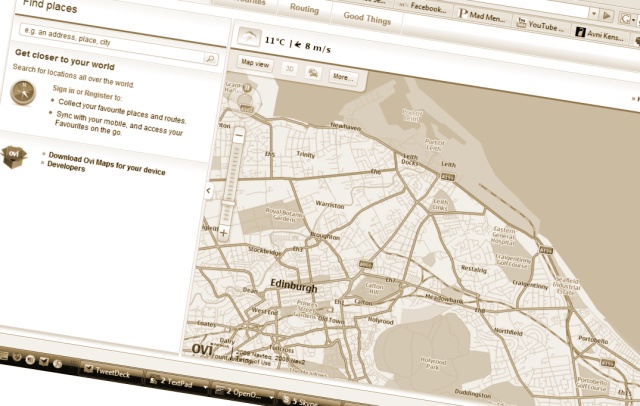Meanwhile, we were comparing the new US local search to the searches available for Reading and Edinburgh (in the UK), and to be honest we couldn't see much difference in the results alongside similar searches in San Francisco. Is this really new?
Err, no. Google's mission has always been along the lines of organising the world's information. And part of that information is where you are searching from – the mobile factor. If you are on a mobile device and searching for Pizza then this should be taken into consideration. And it should be done without having to resort to a special application or link, it should just happen. 'As if by magic' is the key phrase.
Part of that is the tricks used for locating the handset. I can barely get a GPS signal up here in the office where I work, yet on starting local search for pizza, the results were tailored not just for Edinburgh as a city, but on my rough location. Of course, after a moment or two of thinking, this wasn't some super fast GPS location, or even a preference setting, but the use of the cell towers and the database that Google has built up. Why it worked wasn't important. That it worked was enough.

Anyone can carry a computer somewhere, be it a netbook, smartphone or a PDA. But that one piece of information – where you are – provides so rich a context for interaction that the tying in of location aware applications and features to various sites and services on the Internet is likely to be one of the key growth areas in 2010. [People have been saying that for the last 10 years, mind you! - Ed]
The obvious growth area is maps, but this is just the immediate thought. Nokia have already trailed the idea of the Ovi Store being able to provide geographically appropriate applications in the future for the traveller. The oft quoted example of landing in a new city and being offered an electronic Lonely Planet guide is one that's not only practical, but one that everyone can understand. And why shouldn't the occasional application be pushed towards a user?
Now think about some of Nokia's recent moves. The launch of a user generated database through Ovi Maps Good Things potentially hands them the details of thousands of locations around the world that can be relayed to others; the purchase of Dopplr hands them not only a 'social graph' of travellers and the connections they have made, but also a team that understands how to build and nuture a social network of people and their information.
It's an interesting contrast – Google and Nokia both have the map data, but the big G is grafting its search data into a local context, while Nokia are coming at the problem from the other end, allowing the social network to build up content that can be searched on. Both approaches are equally valid, and are of course the best approaches given the respective starting places of each company.
What's interesting to me is that mapping, search and social have all been present in some form in mobile over the last few years – since the Nokia N95 put a GPS in a mainstream device, your location has been an ever present feature on every mid to high-end device, it's just not been brought to the fore. All that is going to change in 2010.
Up until recently, it was a given that every household in the UK received a copy of the Yellow Pages directory, with local content and businesses available at your fingertips. Mobile search is no difference, but by taking account of the unique selling points of mobile, there are two 21st Century equivalents fighting for your smartphone's screen space. The two companies, and all the smaller local services and start-ups, are going to keep each other honest and drive innovation. It's going to be exciting, and while it's not as gee-whiz as some technology, it has the ability to make your life much easier. Especially if you do use your mobile rather than the old printed pages.
-- Ewan Spence, October 2009.
